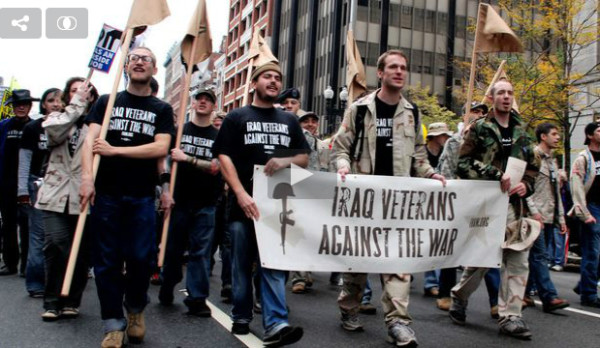Ten years ago, six members of the U.S. military came together to break their silence over what they had witnessed during the U.S.-led invasion of Iraq. They banded together and formed the organization Iraq Veterans Against the War, or IVAW. Over time, they gathered like-minded veterans across the United States to form a contemporary GI resistance movement. Celebrated its tenth anniversary, IVAW members say it is a bittersweet moment as the United States has resumed bombing in Iraq. Today, IVAW chapters are in 48 states and numerous bases overseas. The group has called for reparations for the people of Iraq and Afghanistan — for both human and infrastructural damages caused by the U.S.-led invasion. They have also called for adequate healthcare to be provided at VA facilities, including mental healthcare, for all returning veterans. We host a roundtable with three IVAW members: co-founder Kelly Dougherty, who was deployed to Kuwait and Iraq from 2003-2004; Brock McIntosh, who served in Afghanistan and applied for conscientious objector status; and Scott Olsen, a former marine who served two tours in Iraq and was critically wounded after being shot in the head by a police projectile at an Occupy Oakland protest.
Transcript
This is a rush transcript. Copy may not be in its final form.
AMY GOODMAN: Ten years ago, six members of the U.S. military came together to break their silence over what they had witnessed during the U.S.-led invasion of Iraq. They banded together and formed the organization Iraq Veterans Against the War. Over time, they gathered like-minded veterans across the United States to form a contemporary GI resistance movement. Each of the members has a personal story about why they joined the military, what they witnessed when deployed, and how they came to oppose the U.S.-led invasions in Iraq and Afghanistan. This is Jose Vasquez, executive director of Iraq Veterans Against the War.
JOSE VASQUEZ: I grew up in a pretty tough situation in California. As a high school student, I felt like I didn’t have a lot of options. The only person that was really actively reaching out to me was the Army recruiters. I had some experience with the military, because my dad was drafted for Vietnam, and my uncle served in the Gulf War. So, for me, it seemed like this is something that the men in the family did.
I was against the Iraq War from the beginning. I think in 2004 that was really a turning point for me, when the Abu Ghraib scandal broke. One of my close friends, who I served in the Reserve with, was deploying to Abu Ghraib, and so it really made it personal for me. It kind of brought the war home. For a while I thought I was the only soldier that was opposed to the war, but I started doing research online, and I stumbled across Iraq Veterans Against the War. It was the only place where I heard the voices of soldiers and veterans who were speaking out against it.
AMY GOODMAN: That was Jose Vasquez, executive director of Iraq Veterans Against the War, or IVAW. The group just celebrated its 10th anniversary. They say it’s a bittersweet moment, as a decade later the United States is back in Iraq. Today, IVAW members are in 48 states and numerous bases overseas. The group has called for reparations for the people of Iraq, for both human and infrastructural damages caused by the U.S.-led invasion. They’ve also called for adequate healthcare, including mental healthcare, for all returning servicemen and women.
Well, for more, we’re joined by three of the members of Iraq Veterans Against the War. Kelly Dougherty is the group’s co-founder. She deployed to Kuwait and Iraq from 2003 to ’04. Brock McIntosh is an IVAW member who served in Afghanistan from November 2008 to August 2009. He applied for conscientious objector status and was discharged in May 2014. And Scott Olsen joins us, former marine who served two tours in the Iraq War and was critically wounded—not in Iraq, but after being shot in the head by a police projectile at Occupy Oakland, where he was protesting. He was hospitalized in critical condition with a fractured skull, a broken neck vertebrae and brain swelling. He, too, is a member of IVAW.
See full transcript at Democracy Now!






